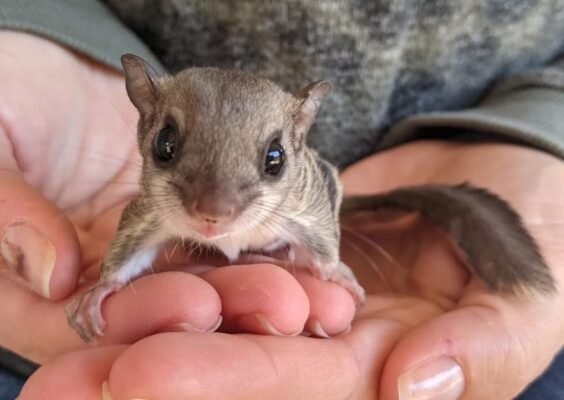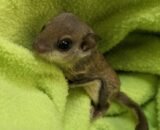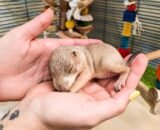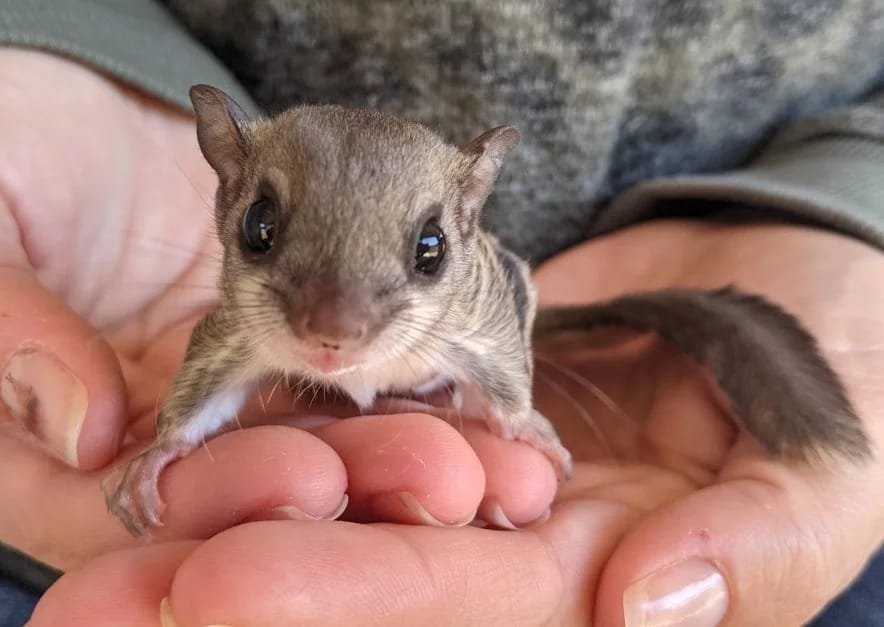- You have no items in your shopping cart
- Subtotal: $0.00
BUY FEMALE FLYING SQUIRRELS
$500.00
BUY FEMALE FLYING SQUIRRELS

Delving Deeper into the World of the Female Flying Squirrel: Masters of Motherhood and More
Female flying squirrels are truly fascinating creatures. They’re not just skilled gliders, but also dedicated mothers and vital members of their forest communities. Here’s a closer look at what makes them so special:
Appearance:
- Similar to Males, But… Generally, females resemble males in overall size and appearance. They have a slender body with soft, gliding fur, typically grey or brown with white bellies. Their most distinctive feature, shared with males, is the patagium – a furry membrane enabling impressive gliding between trees.
- Subtle Size Differences: In some species, females may be slightly larger than males. However, this isn’t always the case, and relying solely on size for identification can be tricky.
The Pouch: A Nursery in the Sky
- Unique Adaptation: Unlike most squirrels, female flying squirrels possess a special pouch on their underside. This remarkable adaptation acts as a safe haven for their young.
- Maternity Ward: After mating, the fertilized egg develops inside the female for a short gestation period (around 40 days). Once born, the tiny, underdeveloped joeys instinctively crawl into their mother’s pouch where they spend the next few months nursing and growing fur.
- Peek-a-Boo Joeys: As the joeys mature, they become more adventurous and will occasionally peek out of the pouch to explore their surroundings. The mother can control the pouch opening, allowing the joeys to enter and exit as needed.
Social Life: Not Quite Lone Wolves
- Sharing is Caring (Sometimes): While not strictly social creatures, female flying squirrels may share den sites with other females, particularly mothers and their young. This communal living offers some advantages:
- Safety in Numbers: Shared dens can provide a degree of protection from predators for both mothers and joeys.
- Cooperative Care: In some cases, females within the den site might help groom or keep an eye on each other’s young.
- Independent Spirit: Outside of denning periods, females tend to be solitary, venturing out alone to forage for food sources like nuts, seeds, and insects.
Reproductive Champions:
- Breeding Throughout the Year (Sometimes): Unlike some mammals, female flying squirrels have the potential to breed throughout the year, although breeding is more frequent during specific seasons depending on location and climate.
- Small But Mighty Litters: The gestation period is typically around 40 days, resulting in the birth of 2-4 joeys. These joeys are incredibly small, weighing only about 3-5 grams (0.1-0.2 oz) at birth.
- Devoted Mothers: Female flying squirrels are dedicated mothers, providing milk for their joeys within the pouch for several months. They also carefully groom and clean their young, ensuring their health and development.
- Teaching to Fly: Once the joeys are fully furred and developed, they practice gliding skills under their mother’s watchful eye. By around 10 weeks old, they are ready to venture out on their own and become independent gliders.
Threats and Importance:
- Habitat Loss: Sadly, female flying squirrels, and flying squirrels in general, face threats like habitat loss due to deforestation.
- Essential for the Future: Female flying squirrels are crucial for the continuation of their populations. Their nurturing behavior and ability to reproduce ensure the survival of future generations.
By understanding the remarkable adaptations and behaviors of female flying squirrels, we can appreciate their vital role in the forest ecosystem and the importance of conservation efforts to protect them. baby squirrel for sale

Categories: Flying Squirrel, Nocturnal, Rodents, Small Pets
Tags: african pygmy hedgehog for sale, baby chinchillas for sale, baby hedgehog, baby hedgehog adoption, baby hedgehog as pets, baby hedgehog breeder near me, baby hedgehog breeders, baby hedgehog for sale, baby hedgehog price, baby squirrel for sale, baby squirrel for sale near me, baby sugar glider for sale near me, bush baby, Bush Baby for sale, buy chinchilla online, buy chinchillas, buy porcupine, buy porcupine quills, buy sugar glider, Capuchin money for sale, chinchillas, chinchillas for sale, chinchillas for sale near me, chinchillas pet for sale, coatimundi, coatimundi for sale, domesticated fox for sale, dwarf chinchillas for sale, Dwarf Goats, Dwarf Pig, exotic animals for sale, exotic animals for sale near me, exotic animals for sale online, Exotic pets for sale, exotic pets for sale in texas, exotic pets for sale near me, exotic pets for sale online, Farm Animals, Farm animals For Sale, fennec fox, fennec fox for adoption, Fennec Fox For Sale, fennec fox pet, finger monkey for sale, flying squirrel for sale, flying squirrel pet for sale, flying squirrels for sale, fox for sale, Hedgehog For Sale, hedgehog for sale in california, hedgehog for sale in nj, hedgehog for sale in ohio, hedgehog for sale near me, hedgehog pet for sale, hedgehog pet for sale near me, hedgehog price, Hedgehogs, kinkajou for sale, kinkajous, kinkajous for sale, Kune Kune Pig, lemurs, lemurs for sale, Long-eared hedgehog, marmoset monkey for sale, Marmosets For Sale, Marsupial, Mini Zebu, Monkeys for sale, Nigerian Dwarf Goats, pet monkey for sale, pet squirrel for sale, piglets, piglets for sale, porcupine, porcupine for sale, porcupine for sale near me, porcupine quills for sale, prairie Dogs, prairie Dogs for sale, Primate, Pygmy Goats, pygmy marmoset for sale. marmoset, red fox for sale, red kangaroos, Red kangaroos for sale, Rodents, Ruffed Lemur, small animals for sale, small exotic pets for sale, Small Pets, small pets for sale, small pets for sale near me, squirrel dogs for sale, squirrel for sale, Squirrel Monkey for sale, sugar glider breeders, sugar glider breeders near me, sugar glider for sale, sugar glider for sale new jersey, sugar glider near me, sugar glider pet for sale, Sugar Gliders, where can i buy a chinchilla, where to buy a chinchilla, where to buy a sugar glider, white chincilla for sale, Zoological







Customer reviews
Reviews
There are no reviews yet.
Write a customer review